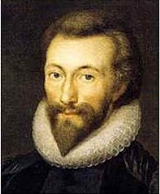
. His works are notable for their strong and sensual style and include sonnet
s, love poetry, religious poems, Latin
translations, epigram
s, elegies
, songs, satires and sermon
s. His poetry is noted for its vibrancy of language and inventiveness of metaphor
, especially as compared to that of his contemporaries. John Donne's style is characterised by abrupt openings, various paradoxes, ironies, dislocations.
And now good morrow to our waking souls,Which watch not one another out of fear;For love, all love of other sights controls,And makes one little room, an everywhere.Let sea-discoverers to new worlds have gone,Let maps to other, worlds on worlds have shown,Let us possess one world, each hath one, and is one.![]()
My face in thine eye, thine in mine appears,And true plain hearts do in the faces rest,Where can we find two better hemispheresWithout sharp North, without declining West?What ever dies, was not mixed equally;If our two loves be one, or, thou and ILove so alike, that none do slacken, none can die.![]()
Though Truth and Falsehood be Near twins, yet Truth a little elder is.![]()
Go and catch a falling star, Get with child a mandrake root, Tell me where all past years are, Or who cleft the Devil's foot, Teach me to hear mermaids singing, Or to keep off envy's stinging, And find What wind Serves to advance an honest mind.![]()
And swearNo where Lives a woman true and fair. If thou find'st one, let me know, Such a pilgrimage were sweet; Yet do not, I would not go, Though at next door we might meet, Though she were true, when you met her, And last, till you write your letter, Yet she Will be False, ere I come, to two, or three.![]()
I have done one braver thing Than all the Worthies did; And yet a braver thence doth spring, Which is to keep that hid.![]()
But he who loveliness withinHath found, all outward loathes,For he who color loves, and skin,Loves but their oldest clothes.![]()
And dare love that, and say so too,And forget the He and She.![]()
Busy old fool, unruly Sun,Why dost thou thus,Through windows, and through curtains call on us?Must to thy motions lovers' seasons run?![]()
Love, all alike, no season knows, nor clime, Nor hours, days, months, which are the rags of time.![]()

